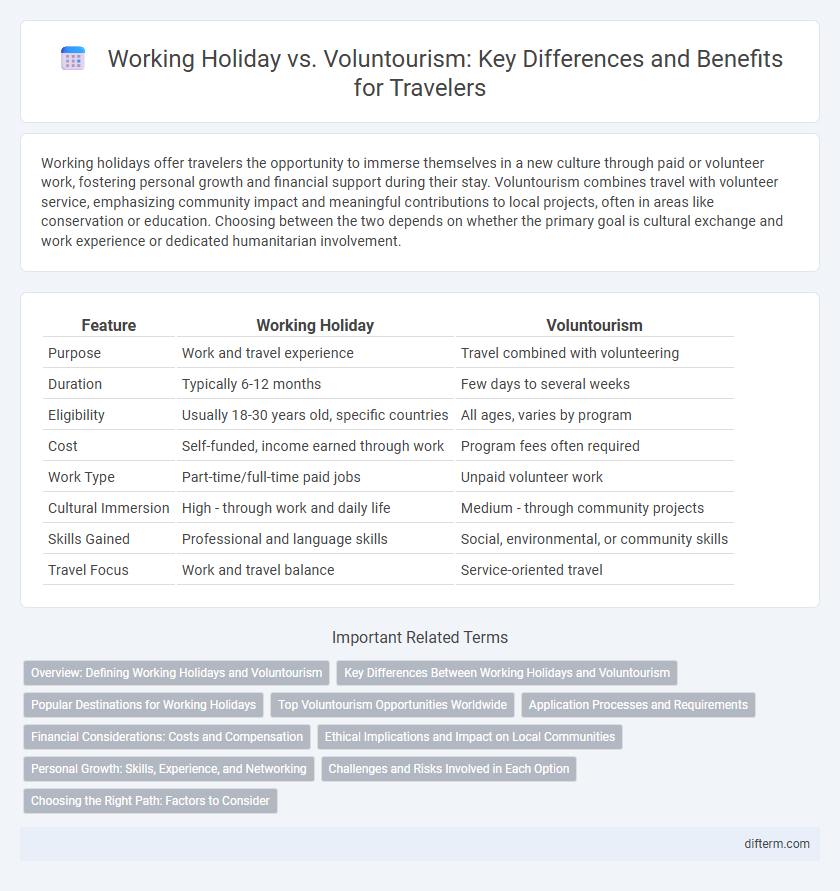Working holidays offer travelers the opportunity to immerse themselves in a new culture through paid or volunteer work, fostering personal growth and financial support during their stay. Voluntourism combines travel with volunteer service, emphasizing community impact and meaningful contributions to local projects, often in areas like conservation or education. Choosing between the two depends on whether the primary goal is cultural exchange and work experience or dedicated humanitarian involvement.
Table of Comparison
| Feature | Working Holiday | Voluntourism |
|---|---|---|
| Purpose | Work and travel experience | Travel combined with volunteering |
| Duration | Typically 6-12 months | Few days to several weeks |
| Eligibility | Usually 18-30 years old, specific countries | All ages, varies by program |
| Cost | Self-funded, income earned through work | Program fees often required |
| Work Type | Part-time/full-time paid jobs | Unpaid volunteer work |
| Cultural Immersion | High - through work and daily life | Medium - through community projects |
| Skills Gained | Professional and language skills | Social, environmental, or community skills |
| Travel Focus | Work and travel balance | Service-oriented travel |
Overview: Defining Working Holidays and Voluntourism
Working holidays combine travel with temporary employment, allowing travelers to fund their trips while gaining work experience and cultural immersion. Voluntourism involves traveling primarily to volunteer for short-term projects that support local communities or environmental causes, blending service with cultural exchange. Both options offer unique opportunities for personal growth, but working holidays emphasize employment and income, whereas voluntourism centers on altruism and community impact.
Key Differences Between Working Holidays and Voluntourism
Working holidays primarily combine travel with short-term employment opportunities, allowing participants to earn income while gaining cultural immersion and work experience in countries like Australia, New Zealand, or Canada. Voluntourism focuses on contributing to community development or environmental projects, frequently without financial compensation, attracting travelers interested in social impact through organizations such as Habitat for Humanity or Conservation Volunteers. Key differences include the purpose of the trip, financial arrangements, and types of activities, with working holidays emphasizing work experience and income, while voluntourism prioritizes volunteer service and meaningful contributions.
Popular Destinations for Working Holidays
Popular destinations for working holidays include Australia, New Zealand, Canada, and Japan, offering diverse job opportunities in hospitality, agriculture, and tourism sectors. These countries provide cultural immersion and legal frameworks allowing young travelers to gain work experience while exploring. Voluntourism hotspots like Costa Rica and Nepal emphasize community projects and environmental conservation, differing from traditional working holiday programs focused on employment.
Top Voluntourism Opportunities Worldwide
Top voluntourism opportunities worldwide include wildlife conservation projects in Costa Rica, community development programs in Nepal, and marine conservation efforts in Australia. These initiatives provide immersive cultural experiences while addressing critical environmental and social issues. Unlike working holidays, voluntourism combines travel with meaningful contributions to local communities and ecosystems.
Application Processes and Requirements
Working holiday visas typically require applicants to meet age restrictions, provide proof of financial support, and submit a completed application form along with a passport and sometimes health insurance documents. Voluntourism programs often have varying application processes depending on the organization, generally involving an online registration, background checks, and sometimes specific skills or language proficiency requirements. Both options may require payment of fees, but working holiday visas usually involve government immigration procedures, whereas voluntourism focuses on program acceptance and orientation.
Financial Considerations: Costs and Compensation
Working holidays often require upfront expenses like visa fees and accommodation but provide financial compensation through part-time jobs, helping to offset costs. Voluntourism typically involves program fees that cover lodging and meals, but participants usually do not receive wages, making the experience more of a financial investment than income-generating. Careful budget planning is essential for working holidaymakers aiming to balance earnings with living expenses, while voluntourists should prepare for out-of-pocket costs despite the included benefits.
Ethical Implications and Impact on Local Communities
Working holidays often provide structured opportunities for cultural exchange and economic contribution, yet can inadvertently create competition for local jobs and contribute to short-term community disruption. Voluntourism, while intended to support local development, risks perpetuating dependency, undermining local expertise, and prioritizing volunteer experience over genuine community needs. Ethical travel demands critical evaluation of impact metrics, transparency in project funding, and prioritizing initiatives that empower local populations for sustainable growth.
Personal Growth: Skills, Experience, and Networking
Working holidays offer immersive cultural experiences and practical work skills in diverse industries, enhancing adaptability and professional networks globally. Voluntourism emphasizes community service, building empathy, leadership, and project management abilities while fostering meaningful connections with local populations. Both paths significantly contribute to personal growth by expanding skill sets, enriching resumes, and cultivating international relationships in travel contexts.
Challenges and Risks Involved in Each Option
Working holidays often involve challenges such as visa restrictions, limited job opportunities, and potential exploitation in low-wage positions, while voluntourism faces risks including unqualified project placements, cultural insensitivity, and potential harm to local communities. Both options can lead to financial strain and emotional stress due to uncertainty and adaptation demands. Thorough research and careful planning are essential to mitigate these challenges and ensure a meaningful travel experience.
Choosing the Right Path: Factors to Consider
When choosing between a working holiday and voluntourism, consider factors such as personal goals, budget, and desired cultural immersion level. Working holidays often provide structured employment opportunities and income, while voluntourism emphasizes contributing to community projects and sustainable development. Evaluating the balance between earning potential and meaningful impact can guide travelers in selecting the path best suited to their interests and values.
Working holiday vs Voluntourism Infographic

 difterm.com
difterm.com